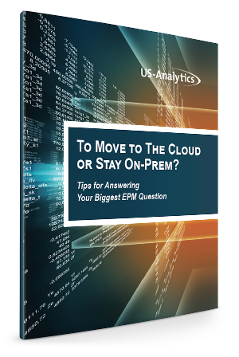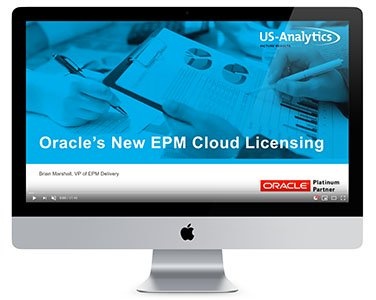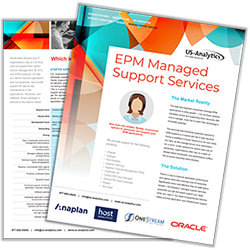In the past couple of years, Oracle has been addressing its future plans for on-prem, and there’s a lot to consider — especially in regard to Oracle Hyperion Financial Management (HFM).
The next version of Hyperion (11.2) is set to be released in December 2019 (Oracle safe harbor applies).
Based on previous roadmaps from Oracle, all of the on-prem tools will be enhanced with new features and functions based on customer feedback. And the loyal HFM fanbase can rest assured that it’s not going anywhere anytime soon.
In this blog post, we’ll go over several reasons why you should consider a continued (or new) investment in HFM, as well as several methods to make your investment a reality.
Upgrading to a New Version
If you're on version 11.1.2.4 (or anything 11.1.2.x), there are a few key dates coming up that you're probably aware of...
- Premier Support ending December 2020
- Extended Support ending December 2021
- Indefinite Sustaining Support
Upgrades are huge projects (especially if you also need to upgrade to FDMEE), so upgrading to 11.1.2.4 from an earlier version probably doesn't make the most sense. But, before completely writing off 11.1.2.4, considering checking out Oracle's explanation for each level of support and what's included.
If you're looking (and waiting) for 11.2, you'll have Premier Support until December 2030. It's a great option for an organization wanting to stay on-prem, and for those who are still hopeful that Oracle might decide to produce another on-prem version sometime in the future.
If you are considering upgrading to 11.2, these are some of the Hyperion Financial Management features you can look forward to.
Upcoming Features
- Automatic consolidations
- Enhanced insights, archiving
- Expanded dashboards
- Web-based metadata
- Web-based metadata editor
- Simulated posting/consolidation
- Entity hierarchy for ICP dimension
- Critical customer requested enhancements
- Matrixed security
Moving to the Cloud
It's not a secret that Oracle Financial Consolidation and Close Cloud Service (FCCS), is not "HFM in the cloud." It's a different tool, based in the cloud, and it might just be right for your organization. Below, we'll review the differences between between the cloud and on-prem solutions at the end of this blog post.
Some organizations with cloud initiatives have also chosen other options, one being completing their consolidations in Oracle Planning and Budgeting Cloud Service (PBCS). You can read more about how this major infrastructure company did just that in the case study below...
Opt for a Blended Approach
When you shop for a new technology and simply go straight to the vendor, it doesn't seem like you have many options — on-prem or the cloud — that must be it, right? Not necessarily.
EPM consulting firms are here to implement the technology in whatever way makes sense for your organization. With that context in mind, there are some other options you can consider, like a blended environment. Some companies have chosen to keep their Hyperion Financial Management solution on-prem for consolidations, while using a cloud-based solution for other functionality not included in HFM.
You can also host HFM on a private cloud, in which a third party takes care of the hardware and data center that only you can access. There are also options for on-premises private or hybrid cloud.
Differences Between HFM and FCCS
According to Oracle representatives at Kscope19, FCCS has now reached a point where it can replace the functionality you're used to within HFM.
When FCCS was first released, organizations that required many custom dimensions within HFM, didn't have the option to move to FCCS, which was is an out-of-the-box tool with 11 predefined dimensions.
This out-of-the-box FCCS is still available, however, the licensing structure for Oracle's cloud-based solutions has completely changed. Out-of-the-box financial close and consolidation functionality is available with the Oracle EPM Standard Cloud (one of the two current license structures).
If you need to customize your financial close solution, the Oracle EPM Enterprise Cloud provides support for complex structures as well as both custom and default consolidation calculations. And with that license, you also get access to all the other EPM cloud product and capabilities.
You can read more about the new Oracle EPM Cloud licensing here, or watch the webinar replay.
Besides functionality, the biggest difference between these solutions is where your financial data is stored. With FCCS, your data is being placed on a “public cloud,” which saves you upfront hardware and maintenance costs. There are ways to extract this data, but you no longer have your own data center and security is provided by Oracle. You will also no longer own licensing for your software with FCCS; rather, you pay a monthly per user fee to log in and use the tool.
Supporting Hyperion Financial Management While You Decide
Most of us have a hard time deciding even the simplest of things — what to have for dinner, what to wear on a date, whether or not to get your cheeseburger animal style (though that choice seems obvious) — so you can count on it taking your organization some time to decide what path to take.
In the meantime, you can utilize a Support Services team to ensure that HFM stays up and running (especially if your Oracle support has run out). A dedicated Support Services team helps you proactively manage your environment and solve any unexpected issues that may arise. It's a team you'll know, who will know you as well as your processes and environment.
To learn more about supporting HFM and other EPM solutions, download the guide...
Moving Forward with Hyperion Financial Management (or leaving it behind)
What you should gather from this blog post is that you have options — cloud, on-prem, both, or you could even opt for a different technology altogether. It's truly about what makes the most sense for you.
If you need helping finding the right path, our advisory team is always here to help. We help companies assess solutions, create roadmaps, and optimize their processes. You can book an appointment to speak with an EPM advisor here.
To learn more about your options for keeping your on-premises software licensing, moving to the cloud, or doing a little bit of both, download the eBook: To Move to the Cloud or Stay On-Prem?








